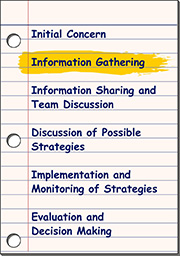What are the stages of the pre-referral process and what do they involve?
Page 5: Stage 2: Information Gathering

- Instructional methods, strategies, and materials that have been previously tried or used
- The student’s skill level
- The student’s background knowledge and experiences
- School and home expectations for behavior and academic performance
- Classroom behavior management techniques
Informal assessments are an especially important tool for gathering these types of information. Such assessments can help the pre-referral team to understand the nature, extent, and severity of the student’s difficulties. For example, if a student is having difficulty with math, the teacher can assess or estimate his or her ability level in various skills (e.g., math facts, computation, word problems). Besides informal assessments, teachers can use a variety of sources to collect information:
- Family members
- Other classroom teachers
- Student portfolios or work samples
- Classroom observations
- Cumulative school records
- Attendance records
- Formal assessments
Pre-referral at Macy Middle School
Stage 2: Information Gathering
 Notes from phone calls between Mrs. Marks and Jeremy’s mom reveal that there has been concern at home about Jeremy’s ability to pay attention and get his homework done. Mrs. Marks’s notes from her conversations with Jeremy’s other teachers indicate that they have seen similar warning signs in their classes—a substantial amount of work has never been turned in. In addition, the science teacher offers samples of Jeremy’s incomplete homework assignments. Mrs. Marks has data from before and after the time that she moved Jeremy’s seat closer to the front of the room and from when she began reminding her class to turn their homework in every day. In fact, the data show that Jeremy has turned in even less work after these changes. The lone exception was band class, where he seems really to excel.
Notes from phone calls between Mrs. Marks and Jeremy’s mom reveal that there has been concern at home about Jeremy’s ability to pay attention and get his homework done. Mrs. Marks’s notes from her conversations with Jeremy’s other teachers indicate that they have seen similar warning signs in their classes—a substantial amount of work has never been turned in. In addition, the science teacher offers samples of Jeremy’s incomplete homework assignments. Mrs. Marks has data from before and after the time that she moved Jeremy’s seat closer to the front of the room and from when she began reminding her class to turn their homework in every day. In fact, the data show that Jeremy has turned in even less work after these changes. The lone exception was band class, where he seems really to excel.